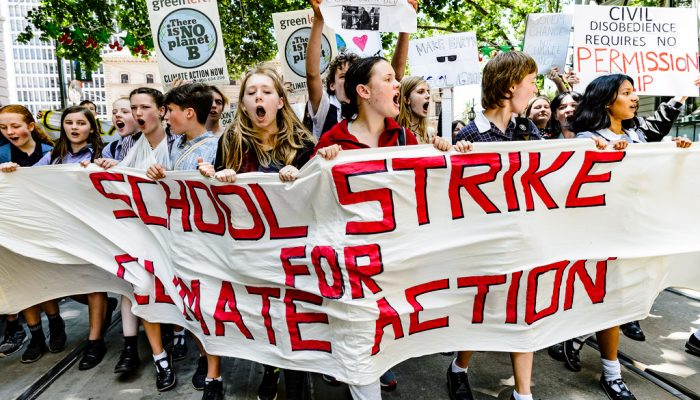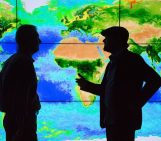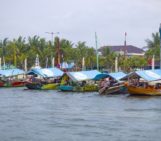
Each month, Jesse Zondervan picks his favourite posts from geoscience and development blogs/news which cover the geology for global development interest. This month’s picks include: The ethical questions behind the school climate strike; Military worries about the fight against sea-level rise – how will you help? Do we have a place in earth’s ecosystems?
School climate strikes
As school climate strikes inspired by Greta Thunberg spread across the world in the past month, adults are starting to ask ethical questions.
If one would prefer climate activism to focus on conventional electoral politics, rather than civil disobedience, Rupert Read argues one should question the premise that our societies are fully democratic. If adults have failed, how can we support and listen to our children rather than telling them what to do?
The idea that young people are the key to making positive change to the way we live in our environment is not a new one, but did you ever wonder why? Steve Cohen at Columbia University’s Earth Institute considers how the experiences of the next generation support a survivalist ethic and a change in environmental politics.
The fight against sea-level rise
If the urgency displayed by our children leaves you hungry to roll up your own sleeves, paradoxically it may appear you could help by joining the army to help fight sea-level rise. At a conference on climate change and security at The Hague defence leaders from around the world expressed worry not only for a risk for conflict risks but also of stress on military capacity in all countries with a coastline, not just the poorer nations.
Alternatively, if you have a more entrepreneurial spirit, I would recommend looking at entrepreneurial opportunities for addressing climate change in the developing world.
Sea-level rise and it’s cost is a hot topic this month, with climatologist Radley Horton testifying on capitol hill about sea level rise.
“There has been a lot of focus on whether worst-case scenario for 2100 is 4.3 feet, six feet, or even eight feet of sea level rise,” he said. “Even the most optimistic scenario imaginable—of one foot of sea level rise by 2100—would have direct and profound impacts.”
Indeed, the house market has already responded and cost US coastal home owners nearly 16 billion in property value. Buyout programs in flood-prone areas are becoming more common, even as they come with their own shortcomings.
The insurance industry recognises that investors, lenders, insurers and policymakers undertake significant risk management efforts to minimise rising losses from climate-related hazards. Might more geoscientists be needed here?
As usual, I have many more interesting topics on offer for you, such as: humans have been present in ecosystems for a long stretch of time, so is there a place for us? Check out all stories below!
School climate strikes – an ethical debate
School climate strikes: why adults no longer have the right to object to their children taking radical action by Rupert Read at The Conversation
Youth Strike for Climate and the Ethics of Climate Policy by Steve Cohen at State of the Planet
Climate Adaptation
How Entrepreneurs Can Help Developing Countries Hard Hit by Climate Change by Georgina Campbell Flatter at Entrepeneur
Prepare now for accelerating climate threats, military officials warn by Laura Goering at Thomson Reuters Foundation
There’s a place for us: New research reveals humanity’s roles in ecosystems from the Santa Fe Institute at ScienceDaily
Sand from glacial melt could be Greenland’s economic salvation from University of Colorado Boulder at ScienceDaily
Climate Change Is Having a Major Impact on Global Health by Tanya Lewis at Scientific American
How pollution and greenhouse gases affect the climate in the Sahel by Alessandra Giannini at The Conversation
Investors and lenders need better tools to manage climate risk to homes, mortgages and assets, finds new research at the Cambridge Institute for Sustainability Leadership
The fight against sea-level rise
Lamont Climatologist Testifies on Capitol Hill About Sea Level Rise by Marie Denoia Aronsohn at State of the Planet
Rising Seas Soaked Home Owners for $16 Billion over 12 Years by Thomas Frank at E&E News
Leave No House Behind in Flood Buyout Programs, Group Says by Daniel Cusick at E&E News
What rising seas mean for local economies from Stanford University at ScienceDaily
Predicting impacts of climate change
The Ocean Is Running Out of Breath, Scientists Warn by Laura Poppick at Scientific American
Disaster Risk
Large-scale hazard indication mapping for avalanches at the Institute for Snow and Avalanche Research SLF
Norway’s Arctic islands at risk of ‘devastating’ warming: report by Alister Doyle at Thomson Reuters
Observing Volcanoes from Space by Emily Underwood at EOS Earth and Space Science News
The U.S. May Finally Get an Early Warning System For Volcanoes by Robin George Andrews at Earther
Deep sea mining
Deep sea mining threatens indigenous culture in Papua New Guinea by John Childs at The Conversation
Check back next month for more picks!
Follow Jesse Zondervan @JesseZondervan. Follow us @Geo_Dev & Facebook.


